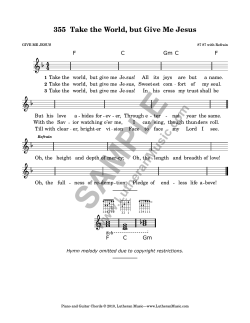
Document 247002
“Why Three? Why Two? Why Me? Why You? Matthew 17:1-‐9 Transfiguration Sunday, March 2, 2014 Growing up in Florida, I will never forget the first time I actually saw a mountain with my own eyes. I was 10 years and I had just finished the 4th grade. My parents took my brother, two sisters, and me on a vacation to the Smokey Mountains to drive along the Blue Ridge Parkway. Having grown up in Florida, mountains were a real anomaly to me. One morning on that vacation, my father had cooked the family breakfast. We stepped out of the log cabin where we were staying near Asheville, NC. There wasn’t even one cloud in that crystal clear blue sky. My father said, “This is the day we are going to journey up to the top of Mount Mitchell. At 6,684 feet above sea level is the highest mountain east of the Mississippi River. What a beautiful day it was! At its summit on a clear day, you may enjoy a 360 degree panoramic view of the surrounding Appalachian landscape, filled with mountains and valleys. Mountains are very important places in the Bible. Do you know that there over 500 references to mountains in the Bible? Noah’s ark came to rest on Mount Ararat. God asked Abraham to take his only son Isaac to the top of Mount Moriah and to sacrifice him there. God gave Moses the Ten Commandments at Mount Sinai. Elijah defeated the false prophets of Baal on Mount Carmel. At the end of the day, all the Canaanites in that region along with the children of Israel jumped up and down shouting: “The Lord, He is God! The Lord, He is God!” King Saul committed suicide on Mount Gilboa. When we come to the New Testament, we are going to hear next Sunday on the First Sunday in Lent that Satan took Jesus to the top of a very high mountain and showed him all the kingdoms of this world. This is when that old evil foe said to the Son of God, “Bow down and worship me and I will give all of this to you!” But the Incarnate Word of God, wielded that Sword of the Spirit very powerfully when he said to the accuser: “Behold, it is written, ‘You shall worship the Lord your God and him only shall you serve!’” Yes, our Lord Jesus was tempted in all such ways as we are, but he never sinned. Jesus begins his Palm Sunday ride from the Mount of Olives and ascends back into heaven from the Mount of Olives too. But today, Jesus is inviting three of his closest disciples, Peter, James and John to journey with him to the top of a mountain, where he will be miraculously transfigured before them. Which mountain that mountain actually was, we can’t be sure! Some say Mount Tabor. Others say Mount Hermon. Nevertheless, most of the events that took place in Jesus’ preaching and healing ministry could safely be witnessed by all twelve of his chosen disciples. There were others, however, that took place in the presence of only three of these men. Exactly why this was we can’t say for sure either. Did Jesus allow only these same three disciples to enter the room of Jairus’ home, where Jesus resuscitated his dead daughter back to new life, because there were space constrictions in Jairus’ home? (Mark 5:37) Was the extent of Jesus’ suffering and passion that took place in the Garden of Gethsemane so intense and mind-‐ boggling, and the extent of Jesus’ agony there, too intense to be witnessed by all twelve? Peter, James, and John once again are privileged to witness this from a distance, though they kept falling asleep and to a large degree, never witnessed it at all (Matthew 26:37). 1. Why were only three of Jesus’ disciples chosen to journey with him to the top of the Mountain of his Transfiguration? Was it because of the command Jesus gives at the end of the day, “Don’t tell anyone about this until the Son of Man is risen from the dead!”? The more people who witnessed this event, the more difficult it might be to keep what had happened under wraps as very privileged information. And why were these particular three men chosen? Was Peter chosen because he was the first disciple ever, who had just six days before this, clearly confessed Jesus to be “the Christ, the Son of the living God!” (Matthew 16:16)? Was James possibly chosen because he would become the first of the twelve disciples to die a martyr’s death? Was John chosen simply because was James’ brother? Or was he chosen, because Jesus knew that he would be the only one of the twelve who would actually be there at the foot of the cross to witness firsthand his crucifixion? We know that John had a special relationship with Jesus, for he is seated next to our Lord at the Last Supper. In a spirit of true humility, John refers to himself in his Gospel account simply as “the disciple whom Jesus loved!” Can we really ever say for sure? Six days after Peter first confesses Jesus to be the Christ, the Son of the living God and six days after the Promised Savior of the world had initially predicted his own death by crucifixion and resurrection: “Jesus took with him Peter and James, and John his brother, and led them up a high mountain by themselves. And he was transfigured before them, and his face shone like the sun, and his clothes became white as light. And behold, there appeared to them, Moses and Elijah, talking with him” (v.1-‐3) Well, if we have just asked ourselves the question: ‘Why three?” 2. We now might want to ourselves the question: “Why two?” Why are there only two men suddenly appearing there with Jesus on the mountain with Peter, James and John, from the Old Testament era, both Moses and Elijah? Leaving all other useless speculation behind, the simplest and best answer seems to be that Moses and Elijah represented the law and the prophets; with Moses being the law giver, and Elijah being one of the greatest prophets ever, right up there in the category of the prophetic guild as John Wayne once was in the guild of actors! We heard three Sundays ago, Jesus speaking to us in his Sermon on the Mount: “Do not think that I have come to abolish the law; for I have not come to abolish it, but to fulfill it!” (Matthew 5:17). Well the next thing you know is that Peter then speaks up and says to Jesus, who is apparently still vested in all of his radiant glory, “Lord, it is good that we are here. If you wish, I will make three tents here, one for you and one for Moses and one for Elijah.” The trouble with Peter is that he often spoke first and did his thinking afterward, if at all. Déjà vu, here we go again. But perhaps we should not be too harsh with Peter, for he had just been awakened St. Luke tells us (Luke 9:32-‐33) out of a deep sleep and did not really know what he was saying. Perhaps we can be far kinder to St. Peter by understanding his comments as a personal expression of his own desire to prolong the glory-‐scene that he is experiencing a while longer. Perhaps Jesus words to him that the Son of Man must go up to Jerusalem and suffer many things at the hands of the elders, chief priests and scribes, and be rejected and crucified, though he’d be raised to new life again on the third day (Matthew 16:23-‐25) is beginning to sink in. If Jesus were going to become the subject of some type of great suffering, Peter would just as soon stay as far away from the cross as he possibly could; at least at this particular point in his life and discipleship. “Peter was still speaking when, behold, a bright cloud overshadowed them, and a voice from the cloud said, ‘This is my Beloved Son, with whom I am well-‐pleased; listen to him. When the disciples heard this, they fell on their faces and were terrified.” BUT HERE IS THE BEST PART OF ALL. “Jesus came and touched them, saying, ‘Rise, and have no fear!’ And when they lifted up their eyes, they saw no one but Jesus only.” Jesus loves these men. So, to comfort them he walks up to them and tenderly touches them. He tells them to arise and to stop being afraid! “And as they were coming down the mountain, Jesus commanded them, ‘Tell no one the vision, until the Son of Man is raised from the dead.’” Why only three of Jesus’ twelve disciples; Peter, James and John? We’ve already discussed this. Why only two representatives from the Old Testament era; Moses and Elijah? We’ve already discussed this too. So finally we ask ourselves, “Why me and why you?” 3. Why me? Why you? The reason you and I are able to hear and celebrate this story today, is because the death and resurrection of our Lord Jesus is now a past event! If Peter, James and John, remained obedient to Christ, at least in this respect, they kept the event 100% to themselves; but don’t you think they must have thought that they had to tell someone; tell someone else what they had seen or they would have burst at the seams? Why me? Why you? Isn’t it because we need to remember that for all of the similarity of what we heard our Heavenly Father say to his only-‐begotten Son Jesus Christ at the hour of our Lord’s baptism, there is a very big footnote here, AT THE Feast of the Transfiguration of our Lord too? At Jesus’ baptism the heavens were opened. The Holy Spirit descended upon Jesus in the form of a dove. The voice of the Heavenly Father was heard: “This is my beloved Son, with whom I am well-‐pleased!” But at the transfiguration event, the powerful footnote follows: “Listen to him!” Of all the myriad of voices constantly coming at us this day, from each other in person, over our cell phones, over the radio, television, and a host of other places, isn’t it becoming more and more difficult to hear the voice of our Savior over all the other competing voices that are constantly speaking to us? Listen to him. “If you continue in my Word,” Jesus says, “then are you truly my disciples and you will know the truth and the truth will set you free!” (John 8:31-32) “My sheep hear my voice and they know me and they follow me and I give unto them eternal life! My father who gave them to me is greater than all, and no one will ever be able to snatch them out of my Father’s hand! For I and the Father are one!” (John 10) And isn’t this to a large degree what the Season of Lent is all about? Just as Peter wanted to stay atop that glorious mountain, we might be tempted to stay there too. But Jesus knows he must come down the mountain because he has a world to redeem, and he wants us involved in that great ministry o f his with him. I wonder if there is anyone here who has heard the delightful little story about the two very sophisticated burglars who robbed a shoe store one night. They didn’t rob the cash register. Nor did they take any of the shoes that were beautifully displayed on the floor. But they did steal all of the shoes that were in stock, in the backroom of the shoe store. The strange part is that they went to great effort to leave the empty shoe boxes very much in tact, so that when the store opened on the following morning, nothing appeared to be unusual at all. The manager arrived at the store at 9:30 AM; the same as always. He conducted a sales meeting with his employees. At 10 o’clock the store opens and the first customer, a very well dressed lady walks through the door. “Go, get her Bill!” the manager says to his top salesman. Bill rushes over. “Good morning, madam!” he says. “Put your little footsy right up here! My, what a nice foot! We’ve got a little number from Paris that will just knock your eyes out!” Bill goes to the backroom, comes back with a shoe box, sits down and opens it, only to discover that the box was empty. Bill begins to stutter: “Uh, uh, excuse me ma’am there is a tiny little problem here! On second thought, maybe this isn’t really the right shoe for you. There’s another shoe in the backroom that I was actually saving for my wife. I think it would look perfect on you! You just have to see it! I’ll be right back!” Bill goes to the backroom now for the second time, only to discover that every shoe box in the store is completely empty. “Boss, we’ve got troubles!” Bill says. “What do you mean troubles?” the manager asks. “Boss, we don’t have any shoes!” ““What do you mean, we don’t have any shoes? Just look at all those boxes!” -‐-‐“But boss, all of those boxes are empty!” The store had been robbed of it most vital element—its shoes—and no one even knew it!” -‐-‐ And can’t the same thing happen, sometimes, in many churches today? The most vital element in the church is the Person of Jesus Christ. If we are not careful, we can lose sight of him. Once we have lost sight of him, we have lost sight of everything. He’s the church’s whole reason for being. This is why our God invites you and me here again today—to pull over along the highway of our lives, and take time to get out of our cars, to stand up and take advantage of a scenic overlook, well maybe not so much of a scenic overlook, as it is a scenic look up! We too need to constantly fix our firm gaze of faith on Jesus Christ. We too need to be certain that of all the other myriad of voices that we are called upon to listen to in this world; that we above all listen to him! Amen
© Copyright 2025









